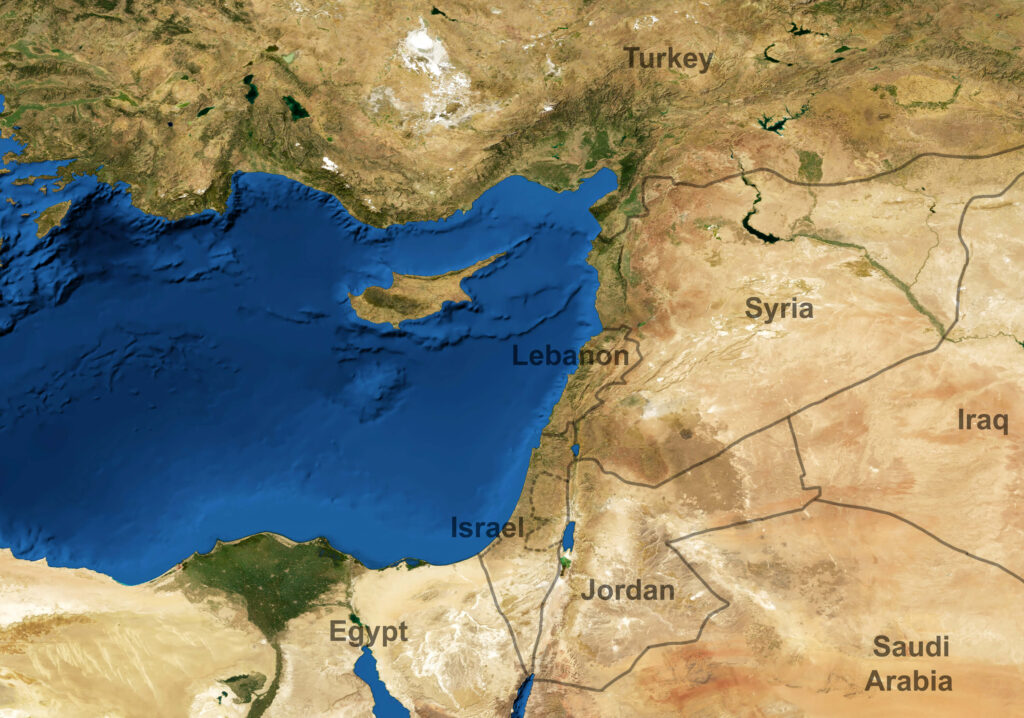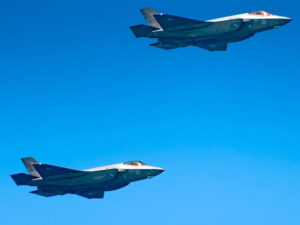From the moment the horrific nature of the Hamas terror attack on Israel became known, the Biden administration stepped in forcefully in a way not seen in the Levant since the October 1973 Yom Kippur War. In fact, the current U.S. military buildup in the Eastern Mediterranean is the largest in history in support of Israel and is unprecedented in nature.
The administration immediately recognized that the Hamas attack may lead to the opening of a second front between Israel and Iran-Backed Hezbollah in Lebanon and perhaps a third front in the West Bank. Which is why as a deterrent measure the president sent a clear warning to Iran and Hezbollah not to take advantage of the situation and attack Israel, announcing the deployment of the USS Gerald R. Ford Carrier Strike Group (CSG) – the newest and largest U.S. aircraft carrier – to the Eastern Mediterranean.
Several days later, U.S Secretary of Defense Lloyd Austin ordered a second CSG, the USS Dwight E. Eisenhower, to begin moving to the Eastern Mediterranean. The Pentagon also announced the dispatch of a U.S. Marine Rapid Response Force, consisting of 2,000 Marines and sailors, to the waters off the Israeli coast, and has sent a Marine three-star general (Lt. Gen. James Glynn) and several other U.S senior military officers to help advise the Israeli military leadership in its operation in Gaza.
U.S. forces have deployed to the immediate region
The gathering forces are reminders that deployment of U.S. personnel into Israel during conflict is rare, while the U.S. has deployed forces to the immediate region more generally.
The first U.S direct military intervention in the Levant dates back to July 1958, when the Eisenhower administration ordered the deployment of 1,700 U.S. Marines to Lebanon in the midst of a civil war pitting the Christian and Muslim communities against each other. Another dispatch of U.S. forces into Beirut in 1983 left 241 U.S. service embers dead, most of them Marines, when a suicide bomber struck a military barracks. The U.S. also regularly provides service members to Egypt’s Sinai Peninsula as part of a multi-national peacekeeping force.
As for direct deployment of U.S. forces into Israel, the 1973 war spurred Operation Nickel Grass, the strategic airlift conducted by the U.S. to deliver 22,500 tons of weapons and supplies to Israel during the conflict, which caught Israel by surprise, though not one U.S. soldier participated in the fighting.
In another instance, on the eve of the first Gulf War in 1990, the U.S. deployed to Israel several batteries of the Patriot air defense missile systems and their personnel to intercept incoming Iraqi SCUD missiles. In another in 2008, 100 U.S. soldiers deployed to Israel’s Negev Desert to operate an X-band radar system to monitor Iranian airspace for any sign of missile launch.
A policy of not asking the U.S. for combat forces
Deployment of U.S. forces into Israel during conflict is the exception because the Israel Defense Forces for decades has been regarded as one of the strongest and most sophisticated militaries in the world, certainly in the Middle East region.
In addition, while Israel has relied on generous U.S military assistance throughout the years providing access to the most advanced and cutting-edge weaponry and technologies, no U.S soldier has fought on its behalf since its founding in 1948.
Yitzhak Rabin in his initial tenure as prime minister in the 1970s was the first Israeli leader to expressly lay out a policy of never asking the U.S. for combat forces, an approach that has been kept by all prime ministers to follow. The U.S and Israel would hold joint military exercises, cooperate closely on missile defense, jointly develop and test new weapons systems like the Arrow and Iron Dome, share intelligence and consult on strategy, yet Israel would never request U.S boots on the ground, beyond auxiliary units.
With the deployment of U.S. forces to the region, the Biden administration is “bear-hugging” Israel, on the one hand ensuring Israelis of continued U.S. support, yet at the same time making sure Israel’s far-right government doesn’t make the situation worse. The formation of an emergency war cabinet, which includes opposition figures such as Lt. Gen. (Ret.) Benny Gantz and Lt. Gen. (Ret.) Gadi Eisenkott, has tempered U.S. concerns, yet Washington is continuing to keep a close watch on Jerusalem’s plans and actions.
President Biden’s recent visit to Israel is emblematic of the strong American commitment to the Jewish state, whose deterrence has dramatically eroded as a result of the Hamas attack and will take time to rebuild. At the same time, it reflects U.S. concerns that Israel should not take extreme measures to beef up its deterrence while worsening an already delicate and volatile situation. One such measure would be to occupy Gaza, which President Biden has said he is firmly against.
Israel has always prided itself on not asking the U.S. to send soldiers to fight on its behalf. If another front opens up, if U.S. forces in the Mediterranean fail to deter, it may have to reverse its longstanding policy.







